七年级下册语法复习资料 2
人教版七年级下册英语Unit2知识点梳理及语法讲义(教师版)
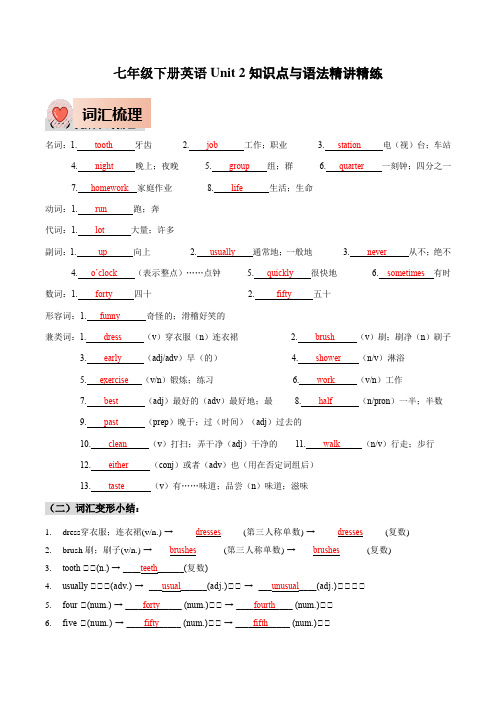
为“What time + do/does +主语+动词原形+其他?”。
Eg. —What time do you get up in the morning? 你早上几点起床?
—At about 6 o’clock. 大约六点钟。
【易混辨析】重点:what time 与 when
单词
用法
例句
图解助记
7. work 牙牙(v/n.) → ____worker____ (n.)牙牙 8. funny 牙牙牙牙牙牙牙牙牙(adj.) → ____fun______ (n.)牙牙 9. best 牙牙牙/牙(adj/adv.) → ___good/well____ (adj/adv.)牙牙/牙 10. half 牙牙牙牙牙(n/pron.) → ___halves_______ (复数) 11. run 牙牙牙(v.) → ____runner______ (n.)跑步者 → ____running_____ (现在分词) 12. clean 牙牙牙牙牙牙(v.) → ____cleaner_____ (n.)清洁工 13. quickly 很快地(adv.) → ____quick______ (adj.)快速的 14. life 生活;生命(n.) → _____lives______ (复数) 【练一练】用所给词的适当形式填空
10. What time does your son usually get ____dressed____ (dress)?
(三)短语攻关:
what time
几点;什么时间
get up
get dressed
穿上衣服
go to school
brush teeth
人教版英语七年级下册 Unit 2 语法精讲
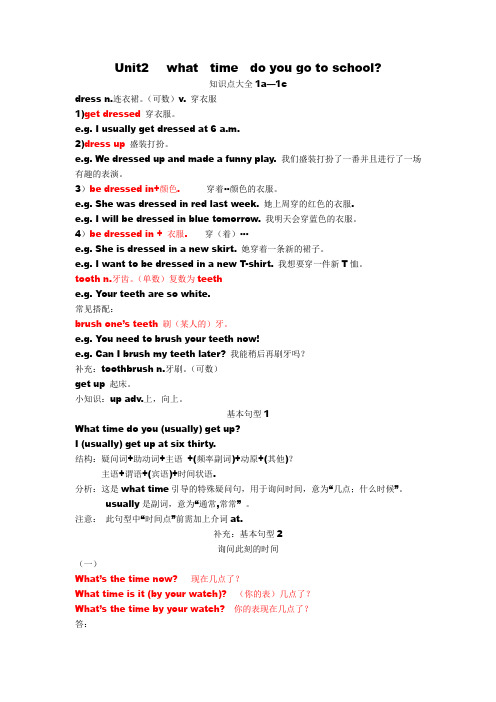
Unit2 what time do you go to school?知识点大全1a—1cdress n.连衣裙。
(可数)v. 穿衣服1)get dressed 穿衣服。
e.g. I usually get dressed at 6 a.m.2)dress up盛装打扮。
e.g. We dressed up and made a funny play. 我们盛装打扮了一番并且进行了一场有趣的表演。
3)be dressed in+颜色.穿着··颜色的衣服。
e.g. She was dressed in red last week. 她上周穿的红色的衣服.e.g. I will be dressed in blue tomorrow. 我明天会穿蓝色的衣服。
4)be dressed in + 衣服.穿(着)···e.g. She is dressed in a new skirt. 她穿着一条新的裙子。
e.g. I want to be dressed in a new T-shirt. 我想要穿一件新T恤。
tooth n.牙齿。
(单数)复数为teethe.g. Your teeth are so white.常见搭配:brush one’s teeth 刷(某人的)牙。
e.g. You need to brush your teeth now!e.g. Can I brush my teeth later? 我能稍后再刷牙吗?补充:toothbrush n.牙刷。
(可数)get up 起床。
小知识:up adv.上,向上。
基本句型1What time do you (usually) get up?I (usually) get up at six thirty.结构:疑问词+助动词+主语+(频率副词)+动原+(其他)?主语+谓语+(宾语)+时间状语.分析:这是what time引导的特殊疑问句,用于询问时间,意为“几点;什么时候”。
七年级英语下册Unit 2 单元重点语法

Unit 2 单元重点语法一、频度副词的用法频度副词是副词的一种,通常和一般现在时连用,表示现在经常或反复发生的动作。
本单元出现的频度副词有always, usually, sometimes, never。
always是频度最大的词,意为“总是;永远”;usually意为“通常”,即很少有例外,频度仅次于always; sometimes意为“有时”;never意为“从不”。
例句:Mike always comes very early.约翰总是来得非常早。
I usually go to school by bus.我通常乘公共汽车上学。
He sometimes plays basketball after school.他有时放学后打篮球。
I will never make the same mistake from now on.我从现在开始将不会犯任何错误。
(1)频度副词一般放在实义动词之前,be动词、助动词或情态动词之后。
I usually take a shower at eight thirty.我通常八点半洗淋浴。
Lucy is sometimes very busy.露西有时很忙。
(2)对频度副词提问时,用how often。
—How often do you exercise?你多久锻炼一次?—Hardly ever.几乎从不。
二、时间表达法英语时间的表达法看似麻烦,其实只要掌握其规律,就很简单。
1.整点表达法:表示几点钟即整点时用“基数词+o'clock”来表示,其中o'clock可以省略。
例如:7:00 读作:seven o'clock或seven5:00读作:five o'clock或five2.顺读法:这种方法是“先读钟点数,再读分钟数”。
例如:8:25读作:读作:3.逆读法:这种方法是“先读分钟,再读点钟”。
(1)表示几点过几分,在分钟后加past,再加小时,即“分钟+past+小时”,但这时的分钟数不能超过30分钟。
Unit2单词语法知识清单人教版英语七年级下册

Unit 2 words and expressions1.时刻读法①顺读法:依次读Eg: 8:10 eight ten12:40 twelve forty9:20 nine twenty②逆读法:(30分钟用half;一刻钟用 quarter)(1)≤30分钟,借助past.“分钟数+past+小时数”12:10 ten past twelve9:30 half past nine10:15 a quarter past ten(2)>30分钟: (60分钟数)+to+(小时数+1)10:45 a quarter to eleven1:55 five to two2. dress. (v.& n.)(v.)穿衣服 (n.)连衣裙Eg: A boy in a black hat is my brother.戴黑色帽子的男孩是我的弟弟。
搭配①sb.get dressed 某人穿好衣服。
Eg: She gets dressed and brushes her teeth.②dress sb./oneselfEg: My son can't dress himself.I have to dress my son every day because he is too young.3.区分4个“穿”:wear:强调穿的状态be in:强调穿的状态(可直接加颜色)Put on:强调穿的动作dress: 强调给自己或他人穿衣服,其后跟人eg: I wear a white coat today.=I am in a white coat today.She wears red clothes.She is in red.Put on your coat.It's too cold.I dress my son every day.4.brush (v.)刷;刷净→复数:brush es(n.)刷子→复数:brush es固定搭配: brush one's teeth 刷牙Eg:I need a brush to brush my teeth.5.tooth [c n.]→复:t ee th类似:foot→f ee t(脚)goose→g ee se(鹅)6.shower(n.& v.)淋浴(n.)淋浴器(间)固搭:take a shower=have a shower 洗淋浴Eg: I take a shower every morning.7. at、in与on①at+具体时刻/noon/night/midnightEg:at 5:00/at noon在正午/at night 在晚上/at midnight 在午夜② in十年/月/季节/一天的上午、下午、晚上Eg:in 2024/in September/in spring/in the morning/afternoon/evening③on+具体某天/或具体某天的上午、下午、晚上/Eg:on Friday/on Sept.12th/on the morning of July 2nd/on a cold morning 8.early adv.早(地) 反义词late 晚(地)adj.早的Eg:We should get up early. 我们应该早点起床I'm always early. 我总是早到。
七年级英语下册unit2 语法专有名词和连词

pupils have read the storybook.
2) or: “或者,还是” “ 否则,要不然” We can visit the park or go to the beach.
祈使句+or+一般将来时陈述句,or :“否则,要不然”
Hurry up or we will miss the bus.
Work hard or you will fail the exam.
第二单元语法
专有名词
连词 and、 but 和also
Grammar1:专有名词
专有名词 表示特定的人名、地名、国名、组织机构名、星期、月份、节假日等的名
词。 1. 人名、地名、国名 、山河名;
人名:Jenny Smith ,Mr White,Tom 地名:the Great Wall ,the Louvre Museum,Shenzhen,Guangzhou 国名:China ,France,Italy 山河名: the Pacific Ocean, the Atlantic Ocean, the Himalaya Mountains
She _g_a_v_e_ ___u__p__ her job and started writing poetry.
【 扩展 】
1 )祈使句+and+一般将来陈述句中,and 表示动作的承接。 Hurry up and we will catch the bus. Work hard and you will pass the exam.
译林版牛津英语七年级下册全册Unit2单元知识点及语法归纳
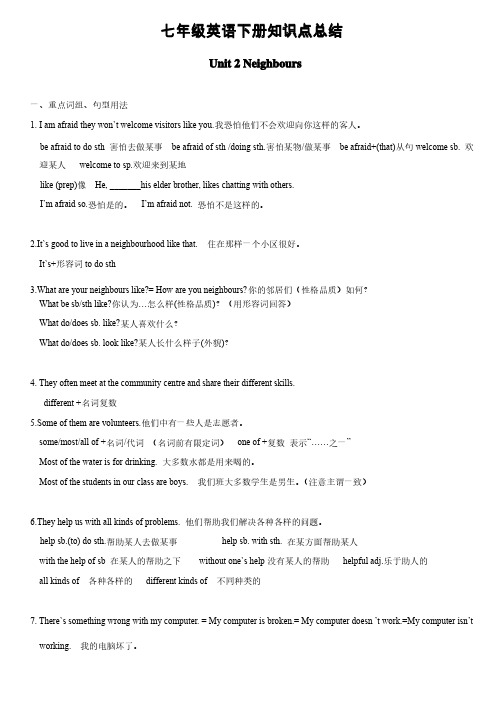
七年级英语下册知识点总结Unit 2 Neighbours一、重点词组、句型用法一、重点词组、句型用法1. I am afraid they won`t welcome visitors like you.我恐怕他们不会欢迎向你这样的客人。
我恐怕他们不会欢迎向你这样的客人。
be afraid to do sth 害怕去做某事害怕去做某事 be afraid of sth /doing sth.害怕某物/做某事做某事be afraid+(that)从句welcome sb. 欢迎某人迎某人 welcome to sp.欢迎来到某地欢迎来到某地like (prep)像He, _______his elder brother, likes chatting with others. I’m afraid so.恐怕是的。
恐怕是的。
I’m afraid not. 恐怕不是这样的。
恐怕不是这样的。
2.It`s good to live in a neighbourhood like that. 住在那样一个小区很好。
住在那样一个小区很好。
It`s+形容词to do sth3.What are your neighbours like?= How are you neighbours?你的邻居们(性格品质)如何?你的邻居们(性格品质)如何?What be sb/sth like?你认为…怎么样(性格品质)?(用形容词回答)?(用形容词回答)What do/does sb. like?某人喜欢什么?某人喜欢什么?What do/does sb. look like?某人长什么样子(外貌)?4. They often meet at the community centre and share their different skills.different +名词复数名词复数5.Some of them are volunteers.他们中有一些人是志愿者。
七年级英语下册Unit2Whattimedoyougotoschool短语语法知识点汇总人教版
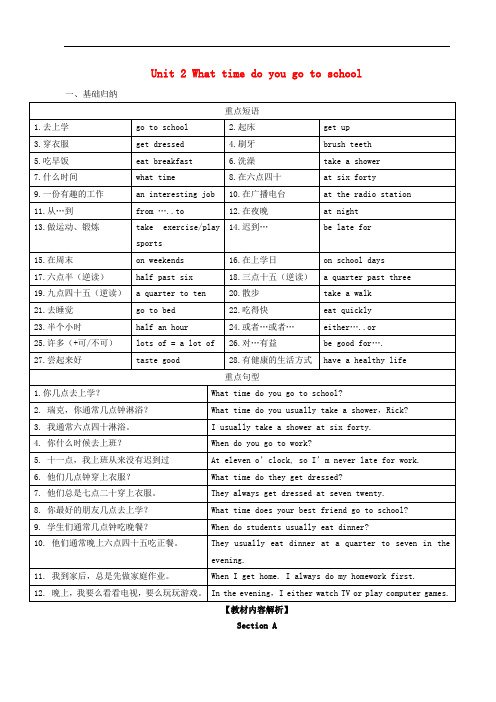
Unit 2 What time do you go to school 一、基础归纳【教材内容解析】Section A1.get dressed (P. 7)get dressed意为“穿上衣服”,dress用作动词,表示“给(某人)穿衣服”,接宾语时,只能接表示人的名词或者代词。
He can’t dress himself.I usually dress my daughter before I go to work.【拓展】辨析wear, put on和dress2.take a shower (P. 7)take a shower意为“洗淋浴”,相当于have a shower,shower用作名词,表示“淋浴”。
I often take a shower in the evening.I take a cold shower when I feel tired.3.What time do you usually get up, Rick? (P. 7)(1)what time用来询问具体的时间点,表示“什么时候”。
What time do you go to school?(2)usually是频度副词,意为“通常、一般”,在句中作状语,一般位于实义动词之前,连系动词be、助动词或者情态动词之后。
I usually have lunch at school.He usually goes to school by bike.4.I never get up so early. (P. 8)early此处用作副词,表示“很早地”,反义词为late,意为“晚地”。
Please come to school early tomorrow.【拓展】early还可以用作形容词,表示“早的、提前的”,反义词是late,意为“晚的”。
He gets up early to catch the early bus.5.Scott has an interesting job. (P. 8)job用作可数名词,表示“工作”,强调具体的职业或者工作,work表示“工作”时,用作不可数名词,指人们日常生活和工作中从事的体力或者脑力劳动,及各类工作。
人教版英语七年级下册Unit2【重点短语+词法语法句法精讲】
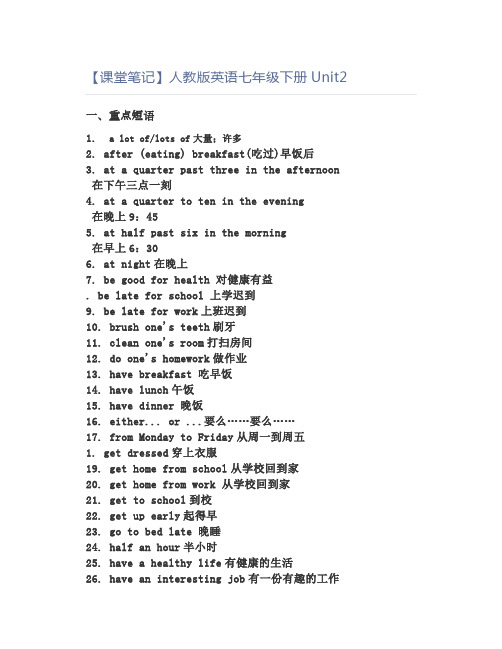
【课堂笔记】人教版英语七年级下册Unit2一、重点短语1. a lot of/lots of大量;许多2. after (eating) breakfast(吃过)早饭后3. at a quarter past three in the afternoon 在下午三点一刻4. at a quarter to ten in the evening在晚上9:455. at half past six in the morning在早上6:306. at night在晚上7. be good for health 对健康有益. be late for school 上学迟到9. be late for work上班迟到10. brush one's teeth刷牙11. clean one's room打扫房间12. do one's homework做作业13. have breakfast 吃早饭14. have lunch午饭15. have dinner 晚饭16. either... or ...要么……要么……17. from Monday to Friday从周一到周五1. get dressed穿上衣服19. get home from school从学校回到家20. get home from work 从学校回到家21. get to school到校22. get up early起得早23. go to bed late 晚睡24. half an hour半小时25. have a healthy life有健康的生活26. have an interesting job有一份有趣的工作27. take a walk散步2. on school nights在上学的晚上29. take a shower洗淋浴30. work at a radio station在电台工二、重点句型1.—What time/When do you usually exercise?你通常什么时候锻炼?—I usually exercise at five o'clock.我通常在5点锻炼。
- 1、下载文档前请自行甄别文档内容的完整性,平台不提供额外的编辑、内容补充、找答案等附加服务。
- 2、"仅部分预览"的文档,不可在线预览部分如存在完整性等问题,可反馈申请退款(可完整预览的文档不适用该条件!)。
- 3、如文档侵犯您的权益,请联系客服反馈,我们会尽快为您处理(人工客服工作时间:9:00-18:30)。
七年级下册期末语法复习资料Unit1定冠词the用冠词a,an,the,/填空。
1. She found ____ bag and ____ interesting photo yesterday. ______ photo was of her grandpa.2. _______ Sun is shining brightly. ______ sky is very bright.3. _____ girl with glasses is Mary.4. Football is one of ______ most popular sports in the world.5. He is ____ first student to travel in Beijing.6.He began to learn playing ______ piano/violin/guitar at five. 7. _____ Smiths are making a trip to _____Beijing.8. We should take care of ____ old.9. We often have ___ lunch at 11:50 and play __ basketball/football/table tennis/chess after class.10. We go to ___ school in ___ morning.Unit2专有名词和连词and, but, so, because一.将下列短文中书写错误的单词划出来,并将其改正在单词上方。
Last july, I went to beijing to visit uncle zhang. He took me to many interesting places such as the great wall, the summer palace and the palace museum. I learnt a lot about the ming and the qing dynasties. We also visited the main stadium for the 2008 olympics. We went shopping on wangfujing street. I had a wonderful time in beijing and I plan to visit it again during the spring festival next year.二.用连词and, but, so, because 填空。
1. I ’m a middle school student now _____ I want to be a doctor in the future.2. He likes English very much, _____ he isn ’t good at it.3. I didn ’t catch the early bus, _____ I was late for school this morning.4.Work hard _____ you will be successful.5.Get up early ____you will be late for school.Unit3反身代词和方位介词Unit4现在进行时态1. I am talking now.现在进行时态表示现在、此时此刻(指说话人说话时)____________的事情;2. We are preparing for the final exam these days.现在进行时态表示____________________________________________的事情;3. 现在进行时态的结构构成:____________ + _______________( / / ) ( )4. 写出下列动词的现在分词形式。
play ___________ write ___________ run ___________ lie __________ die__________5. 用适当时态填空:a. Look! I _________________ (read) a book. She _______________ (write) a poem. They______________ (run) in the classroom.b. I _________________(know) the answer now.c. She _______________(leave) for Shanghai.d. They ______________(not stay) at home.______ Jane ___________(swim) in the river? Yes, she ____./ No, she ____.What ____ your father _____________(do)?Unit6 情态动词用适当的情态动词填空1. I ________ swim and she _______ dance. He ____________(not) sing English songs.2. What _______ I do for you?3. ____________ I borrow your pen? Yes, you ______________.No, you ______________.4. Jane _________ arrive at school before 7:15am. We __________ play football in the street.5. Must I turn on the TV now? Yes, you __________. No, you ________________________.6. He __________ be in Beijing now because I just saw him in the classroom.Unit7 祈使句、感叹句祈使句用来表示_____________、____________、___________、____________、___________等。
特点是谓语动词是___________, ___________主语(you )。
一.用动词适当形式填空:1. Please _________(open) the door. ______________(not close) the window.2. __________(be) quiet! _______________(not be) noisy!3. Let us _________(go) to the park. Let ’s ____________(not pollute) the water.4. __________(work) hard and you will be successful.5. __________(get up) early or you will be late for school.感叹句表示_______、_________、__________等感情,感叹句结构主要有_________、________引导,修饰名词用_______,其余都用_____。
句末用________。
练习(填空):1. ______ kind man he is!2. ______ interesting books you are reading now!3._______ exciting news it is!4. ______ kind the girl is!5. _____ fast he can swim!6. What an interesting story _____ _____!7. How clever the boy _____!8. How fast he ____(run)9. _____ a lovely girl she is! = _____ lovely ____ ________ is!Unit8时间状语从句及used to/didn’t use to的用法时间状语从句:_______(当…时候)、________(当…时候)、________(一旦)、_____________(一…就…)、________(在…之前)、________(在…之后)、_____________(直到…才…)可以引导时间状语。
注意:如果主句是一般将来时,从句只能用____________. 如果主句是一般过去时,从句用与__________有关的时态。
从句在前主句在后,需要用_______隔开主从句。
练一练(填空):1. It was dark ______ we got home.2. _____ she was eating, I _______ (come) in.3. We should get to the cinema ________ it starts.4. She didn’t fall asleep _______ her mother came back last night.5. I _____________(call) you as soon as I ________(come) back home.used to do sth/ didn’t use to do sth 表示过去常常(不)做某事,是情态动词,应把它看成一个整体。
注意区别于实义动词use(使用,利用)。
use sth to+ do sth “利用…做…”填空:1. He used to ______(is) a naughty boy.2. Mary didn’t use to ______ (eat) apples.3.我过去常常跟我的妈妈在晴朗的夜晚出去仰望天空。
I ________ _______ go outside with my mum on clear nights and look at the sky.4.我过去常常没有很多钱。
I ________ __________ _______ have money.5.她的爸爸过去常常什么时候带她们去公园呢?When _____ her dad ________ ________ take them to parks?6.我用自己的知识告诉人们有关星星的事情。
